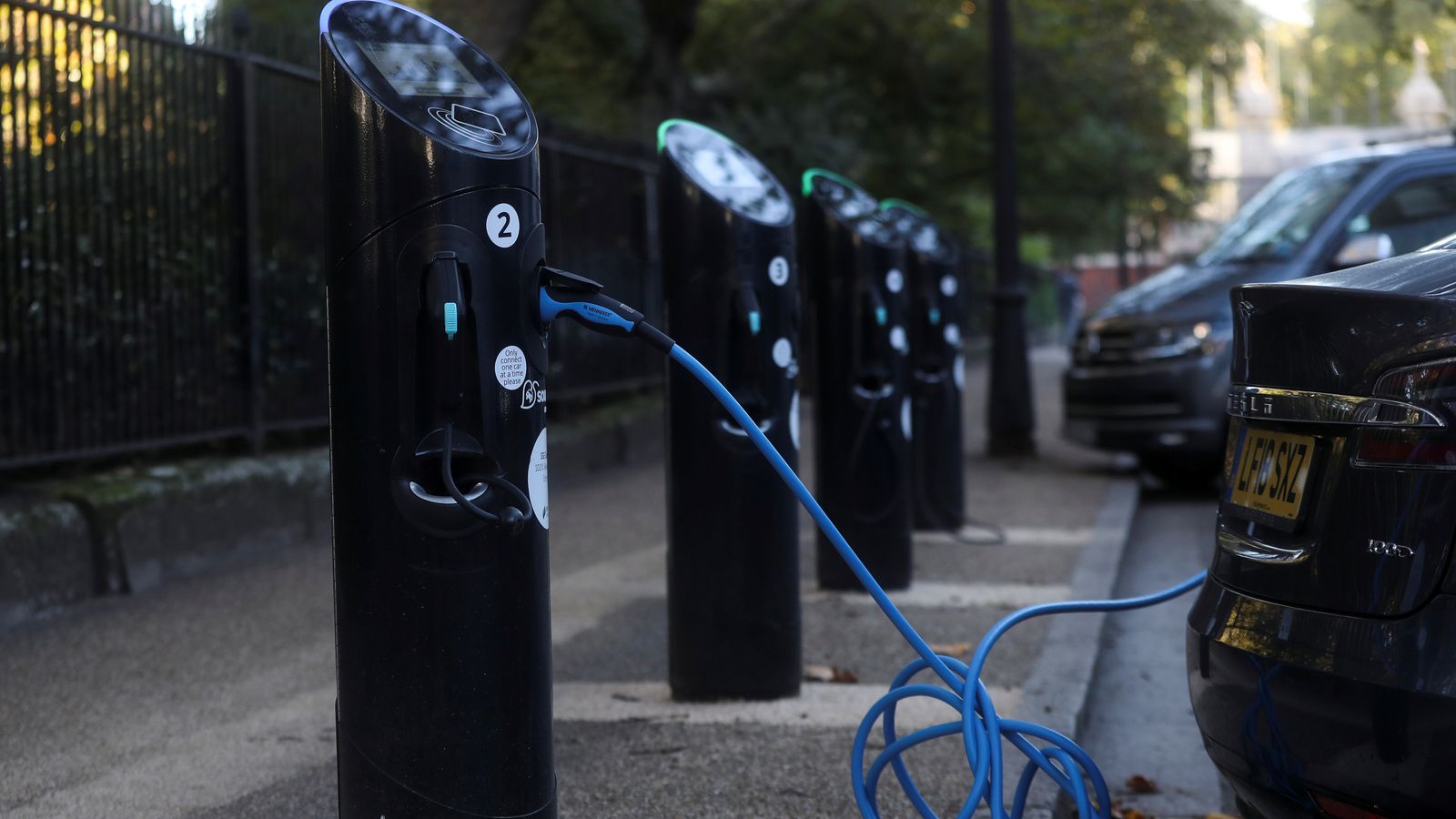Jeremy Hunt’s autumn statement has failed to offer much cheer to markets, with the pound faltering and stock indexes falling below their opening mark.
Sterling had already fallen around 0.5% – going from $1.193 to $1.1850 – by the time the chancellor rose to his feet in the Commons.
But after he finished, it continued to fall, down 1% at $1.178 just before 2pm.
Biggest ever fall in living standards forecast – autumn statement live
The FTSE 100 was down around 0.7%, while the more domestically-focused FTSE 250 was down 0.35%.
Marcus Brookes, chief investment officer at Quilter Investors in London, said: “Today’s autumn statement has painted a bleak picture for the UK.
“Markets originally reacted well to the steady hand of Jeremy Hunt.
Autumn statement: Jaw-dropping change of tack as Jeremy Hunt announces more spending – and sets trap for next election
Household disposable incomes are heading for their biggest fall on record
Autumn statement: Education, NHS, defence and HS2 – which government departments and projects are the biggest winners and losers?
“They will continue to give him the benefit of the doubt and see the impact of this plan, however, there is also a chance that they see this as an overcorrection and that the measures could stifle what economic growth was present.”
Shares in Shell and BP were both down, albeit marginally, after Mr Hunt confirmed that the energy profits levy – or windfall tax – would be increased from 25% to 35% from next year.
The announcement was not a big surprise, which is one reason why share prices did not react as badly as they might otherwise have been expected to.
Read more:
Autumn statement key announcements
Inflation at highest level since 1981
Susannah Streeter, senior investment and markets analyst at Hargreaves Lansdown, said: “The door was inched open even further on the case for a windfall tax following comments made by Shell’s outgoing boss, Ben Van Beurden, that the tax burden had to fall on the energy sector to help the poorest in society.
“That’s partly why the reaction has been relatively muted in terms of their share prices.”
Business presenter
During recent days there have been suggestions in the stock market that investors were being too pessimistic about the windfall taxes likely to be lumped on electricity generators.
Happily, for shareholders of those companies, that has proved to be the case.
The chancellor slapped the generators with a 45% levy on the ‘excess profits’ being made by them.
Initially that sent share prices sharply lower but, once analysts had worked out what that would mean for shareholder returns, there was a rally.
Shares of SSE, which owns both gas-fired and renewable generating capacity, have risen by 0.5% after initially falling by 3%, while shares of Drax Group, another renewable generator, are up by 4% at the time of writing.
Shares of Orsted, the Danish wind generating giant with significant UK operations, have fallen only very slightly in Copenhagen.
Shares of British Gas owner Centrica, which owns a fifth of the UK’s remaining nuclear power stations, have risen by more than 4%.
The other big tax raid launched by Jeremy Hunt was on the oil and gas sector.
There, Jeremy Hunt extended his existing ‘energy profits levy’ on oil and gas companies, from 25% to 35%, while extending the life of the latter from four years to six years.
That measure – along with the swoop on the electricity generating companies – will raise, according to Mr Hunt, £14bn next year alone.
However, as with the electricity generators, Mr Hunt’s raid appears to have been fully priced in by investors in a number of cases.
Shares of Harbour Energy, the biggest independent player in the UK North Sea, had fallen by 29% from the end of August to Wednesday evening but have rallied by just under 1%.
Shares of another big North Sea player, Serica Energy – which had fallen by 21% from the end of August until Wednesday evening – rallied by 4.25%.
That said, shares of two other North Sea oil specialists, Enquest and Energean, are off by 2% and 3% respectively.
Some will look to BP and Shell and wonder why their share prices have not moved more.
The answer is because these are global multinationals and the vast majority of their profits are made outside the UK.
The North Sea is a comparatively small part of their businesses. Were the US to be hitting them with something akin to what the UK has done, though, it would be a different matter.
Finally, for those who may take some pleasure out of seeing energy companies being hit with higher taxes, a reminder.
There is no such thing as a tax on businesses.
All taxes levied on businesses ultimately fall on people – whether that is the owners of those businesses (entrepreneurs or shareholders), their employees or their customers.
The windfall tax will also be extended to electricity generators but shares in many of these companies were up, reflecting again that – with a number of reports predicting the move – it was mostly priced in to markets.
The economy is widely predicted to shrink next year – the Bank of England has forecast a two-year recession, and Mr Hunt confirmed that a contraction is expected.
But he said the UK would bring down its government debt as a percentage of GDP within five years under his plans.
Government bonds edged lower, while bond yields – which were already up before Mr Hunt’s statement – rose further.
The losses were modest, however, compared to the sharp sell-off sparked by the short-lived “mini-budget” announced by previous prime minister Liz Truss and her chancellor Kwasi Kwarteng in September.
The benchmark 10-year gilt yield was up seven basis points to 3.21%, while the two-year yield rose 12 basis points to 3.104% having traded at around 3.07% just before Mr Hunt started speaking.











